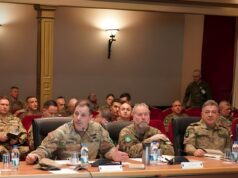The Ministry of Defence (MOD) has responded to concerns raised by Tanmanjeet Singh Dhesi (Labour – Slough) regarding retention rates across the UK’s armed forces, with a series of initiatives aimed at improving workforce stability in the Royal Fleet Auxiliary (RFA), Royal Air Force (RAF), Royal Navy (RN), and British Army.
According to a response from Al Carns, Parliamentary Under-Secretary (Minister for Veterans), these efforts are part of a Defence-wide initiative under the newly established Recruitment and Retention Board. The government is committed to addressing the recruitment and retention challenges that the forces are currently facing.
“The Royal Fleet Auxiliary (RFA) are highly valued, specialist personnel. We are committed to listening to their concerns and keeping a continued dialogue to address the issues they have raised,” said Carns in his response to Dhesi’s question about improving retention in the RFA. Recruitment and retention remain top priorities for the RFA, with work already underway to address pay disputes and improve terms and conditions.
Carns also highlighted that the MOD is focusing on shortening recruitment timelines and introducing modernised allowances and pay to remain competitive.
The RAF is also implementing a range of initiatives to improve retention, including increased funding for welfare projects and investments in infrastructure to improve accommodation. “Retention initiatives include the establishment of working groups to improve the lived experience of our people, increased funding for welfare projects, investment in infrastructure to improve accommodation, and increased opportunities for through-career education and promotion,” Carns stated.
He added that these initiatives are aimed at ensuring personnel feel valued and are provided with the leadership and resources they need to thrive in their roles. A key focus of these initiatives is to improve career satisfaction, which is seen as integral to retaining skilled personnel in the long term.
The Royal Navy has also established a high-level Retention Steering Group to better address retention challenges. “The RN has established a high-level Retention Steering Group to coordinate all retention activity, analyse outflow data and ensure that quicker action is taken to counter outflow trends,” Carns explained. T
he Navy is focusing on improving career management during the early years of service, particularly addressing retention peaks at three and six years of service. Furthermore, enhancing health and wellbeing support for deployed personnel and providing greater stability for the workforce are key areas of focus.
The British Army’s approach to retention includes a comprehensive strategy that covers financial and policy initiatives aimed at improving workforce retention throughout the employee lifecycle. “Retention is one of the Army’s top priorities, supported by Defence. A retention strategy has been launched to address barriers to retention through a holistic set of financial and policy initiatives spanning the entire employee lifecycle,” said Carns.
The strategy is supported by an annual retention fund and is monitored by the Army Personnel Campaign Board.
At the UK Defence Journal, we aim to deliver accurate and timely news on defence matters. We rely on the support of readers like you to maintain our independence and high-quality journalism. Please consider making a one-off donation to help us continue our work. Click here to donate. Thank you for your support!













Better pay, proper accommodation and support for families.
There, solved it for you
I’d add, by having more mass, kit and people are worked less as the workload is spread around.
But that would mean HMG increasing mass, and they seem allergic to that concept.
What happened to the old harmony guidelines about the max length of time deployed in a given period?
This is the problem I see daily. The guys are treated more like robots than humans and of course you always hear ” You’re paid 24 hrs a day” being extolled. The blokes are knackered and I must say there wasn’t the same amount of boolshit paperwork and regulations (D&I?) that I saw when I was in
Funny how D&I is always listed as bullshit when the VAST majority of D&I is just “Don’t be a cunt.”
I guess when you think about it, it makes sense the why the kind of people who complain about it complain about it.
Its a little more complex than that. When I served in the RN I never heard anyone say they are leaving because of the pay.
yep 100%
We were not paid a going rate for what was delivered but delivered anyway. The delivery was the issue. Long days and nights without recognition, extra jobs, (normally other peoples because they had quit and there was no replacement) which increased workload, stress and the feeling of nobody cares just get the job done no matter the mental cost.
A lot of lads just got fed up of the 4 hours driving up the line on a Friday afternoon/Sunday evening too. The short shore time periods didn’t help either. They introduced the core working week which did help traveler’s more when a vessel was alongside for an extended period.
And certainly at main operating bases accommodation standards are pretty good. SLAM blocks. Double bed, en suite bathroom/shower, plenty of storage, Internet access, kitchen area. Married quarters are a different story. Smaller camps and training units is usually where you will find the poorer end of accommodation.
SLAM’s generally okay for someone in their teens or early 20’s, but once you’re above that age? It really isn’t.
What sort of accommodation would suit that demographic of the over ‘early 20s’?
SLAM’s and even the Sergeant’s mess is basically a recreation of University Dorms of sorts. It was generally instituted with the idea that people would get into marriages after about the age of 25 and then move into Pads. That worked in the more traditional conservative life style the army likes to imagine is universal still (I also used to have thoughts about the Army’s accommodation policy rushing squaddies into badly thought out, unhealthy relationships because they where heavily incentivized to get married to get a pad).
But I know so many squads (late 20’s or 30’s) now that, either because they’re single later in life, or are in long term relationships where their partner isn’t following them around the country as they move from post to post, spend their weeks living in the tiny room the army provides them with, finish work on a Friday and rush home to spend 2 days living in a semi-detached house with a garden, bedroom, living room etc.
The SLAM/PAD system is fundamentally build on principles that just don’t apply anymore. There isn’t an easy fix to this of course, or if there is a fix it’ll be a massive project that’ll take huge amounts of time and effort, but if we’re talking retention “Hey I’d like to live at home with my family in my house instead of having to commute to the SLAM every Sunday evening/3am on a Monday morning.” Is a pretty compelling reason to sign off.
(There are efforts being directed at this, the FAM scheme that got shot down, had a provision for helping squaddies rent civilian properties in the local communities I believe, so it’s something the MoD at least on some level understands, but the FAM I guess isn’t happening at the moment, and I’m not sure how realistic it would have been had it gone through).
At RAF Cottesmore they did trial a scheme where a single lad could rent a surplus married quarter as long as they didn’t throw parties every weekend and upset the neighbours. I’m not sure how long it lasted though.
But what else should they provide? I guess more of an apartment style room would have been good, but I comes down to cost.
There are options, but as I said, they’re going to require a major mindset change by the forces and considerable investment. Unfortunately the Armed forces in general have boxed themselves in, seeing things like accommodation as things that need to be ‘accommodated’ rather than things that, at a high standard, would be a recruitment and retention bonus.
The armed forces have unfortunately boxed themselves in by imagining that everyone is going to get married and move into a pad with their wives and have kids, and have compounded the issue with super garrisons. As I said in my reply to Graham, it requires a systemic rethink, which the armed forces are incapable of.
And making it quicker to get in once you apply!
The pay issue is difficult. The AFPRB has existed for many decades and annually assesses service jobs against civilian ones, and makes recommendation for the pay award and revised costs for accomodation etc. There is also consideration of the drawbacks of service life and that is reflected in the pay award (used to be called the X Factor).
Are you saying that pay comparability should be scrapped…and the services just awarded a random and very high pay award every year?
The comparability went years ago.
When I started as a 16 yr old baby tiff in HMS Fisgard the old and bold godlike Chief Tiffs pay (Then that title and responsibility became Charge Chiefs and latterly WO2s) and responsibilities was compared and calculated against that of an intercity train driver, London to Edinburgh.
That isn’t the case now. Responsibilities remain comparable but the renumeration for it has dropped away with regards to pay, leave, working week, hours worked, time away from home etc.
End fake sincerity and to show real appreciation.
“improving workforce stability”…in the RFA. Umh, pay rise?
The MOD could helo with using short words. Every press release is gobblygook.
…but not by helo. Try again…help
Too little too late. Stick it where the sun don’t shine.
After 23yrs service, the 24th couldn’t come soon enough for me. I’m done with getting shit on from great heights by what seems like all of the time and from all directions, why all the other face timing gobblers get all the reward.
Anyone asking me for my advice in the future on whether they should join the forces, will be getting told a firm no f**king way, don’t do it. Go get yourself an apprenticeship, make something of your life.
You then if course have the usual can(s) that have always been kicked down the road, accom, food, pay, families, work/ life balance and of course all this woke bullshit slowly filtering it’s way in. Altogether, it’s slowly ruining/undermining the once great forces this country had.
But you get an apprenticeship when you join the forces. Nearly every role offers an apprenticeship. No reason you couldn’t just join, complete your apprenticeship then leave.
There is that John yes, but only within selected trades, in the Army anyway .
When I joined as a baby tiff and apprenticeship went like this.
12m HMS Fisgard- Class room work (Tech college type stuff maths and physics) workshops fitting and turning, electronics making circuits and equipment, naval general training
12m HMS Collingwood more tech training in T school but aimed at your general specialisation be which for me was Weapon Engineering Electronics
12m at sea on an FF/DD as an apprentice doing on job training and work experience
18m back in Collingwood doing deep specialist training which in my case was Ordnance Control Engineering. So, more workshops, welding, soldering, milling, fitting and turning, Electronics, Explosives, Control Engineering, Alignment, Weapon systems, Gunnery systems. Heavy Electrics, Hydraulic Engineering
At the end of that I qualified and was rated as Leading Weapon Engineering Artificer.
Then Sent to a shore base for journeyman’s time and then rated PO for my first sea job running a section on a T42. At that point doing what I was trained to do I was a 21 year old no badge PO.
I got a HNC/HND out of that. With most of my courses at BTEC 4 or 5. I translated it to a Masters Deg in later life with all the other courses ( Leadership, divisional, promotion career courses, equipment courses, work experience etc)
Now tell me a modern apprenticeship is the same…
It isn’t even close.
Seems good enough to have kept you on for a full career though.
If you’ve ever served Dern, you’d know for a dam fact that when you reach a certain point in your career, you’d be stupid to leave before completing either half or in my case a full career.
I made nearly 34 years minus a couple of months. I was lucky enough to get 3 foreign jobs along with UK shore jobs(Hong Kong, Naples Italy and KSA) I had 8 sea drafts and left as a WO1 at the top of my professional tree.
I lived on a UK patch once (it was shit). I owned my own house and my missus basically brought up the kids on her own whilst I was a sea and I was at sea a lot.
The foreign jobs where compensation for the experience and the additional pay and then the pension at the end of it.
Did I enjoy it. Of course I did…well the good bits anyway.
Would I do it again looking back or recommend it to other now?
No absolutely not.
You claim to have had a miserable time, yet didn’t sign off at any point… plenty of opportunity to do so before your 24 or even 12 year point.
And yet you stayed for 24 years anyway. Can’t have been that bad.
When you get a new senior NCO its expected that they are going to be a bit zealous in the first few weeks but when we got our new RSM he was still behaving like a lunatic after a year. I and a lot of other lads in my platoon were quite happy running on open contracts and seven of us gave notice after three months of his tenure and left. Across the Battalion he had a similar effect. Add that to crap accomodation, RP’s bullying for the sake of their own amusement and the fact that the pay is higher outside the army is nearly always better. The bottom line for most in my experience was stop treating the boys like shit and they might not leave.
Navy struggling to man ship’s even though so few,are we going to have so few troops our Army can’t man Tanks again so few , an RAF with aircraft SQNs disappearing .The government must put this has priority rather than worry about the Environment ,🙄 finding plenty of money for that amongst other things etc .Sorry for rant guys.
Why not scrap DEI. There are a million youngsters who live in deprived cities and towns across the UK who are deterred from enlisting and this is a waste of a future for our youth who have very little alternative prospects of learning a trade and valuable skills. Bring back recruiters from all serving branches of our armed forces and stop recruiting 000s of men from Nepal which is not a commonwealth member. Jobs should be given to our own youth and we should disband the Nepalese Army Brigade units which accounts for 8% of MOD regular army personnel strength and manpower, this is a huge number of men recruited from just one foreign country which is a close ally of China and India.Ir is time to recruit the youth of the UK.